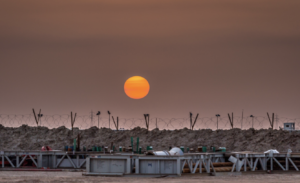Ads
There are numerous reports indicating that the government of Denmark has informed the United States government about discussions regarding potentially increasing the military presence of the United States in Greenland. This communication was sent to U.S. officials on multiple occasions, expressing Denmark’s interest in allowing the U.S. to have a greater influence over Greenland’s affairs.
It has been widely rumored that Donald Trump is engaged in a telephone conversation with his son, during which he allegedly reassures the people of Greenland that they will be treated well. The President-elect’s team has also expressed a willingness to engage with the U.S. on security matters in Greenland, following Trump’s public statement expressing interest in purchasing the territory.
The news outlet Axios was the first to report on a recent discussion between Danish officials and the incoming U.S. administration regarding the implementation of security measures in Greenland. The primary topic of conversation was increasing the number of U.S. military personnel stationed in Greenland, a move that is being actively considered by both parties.
Denmark has reportedly reached out to the Trump team seeking clarification on the President-elect’s comments about potentially using military force to secure control over Greenland. There have been concerns raised about the implications of such statements, prompting Danish officials to seek further insight and understanding from the incoming administration.
Despite asserting that Greenland is not for sale, Danish authorities have indicated a willingness to cooperate with the Trump administration to achieve common goals in the region. Greenland, situated in the Arctic Ocean, holds strategic importance for the national security of the United States, prompting efforts to address security concerns and establish mutually beneficial agreements.
In response to escalating tensions, Denmark appears to be pursuing diplomatic channels to address the situation and establish clear communication with the incoming U.S. administration. The engagement between the two countries underscores the importance of maintaining stability and cooperation in Greenland, a region of significance for both global security and environmental considerations.
President Trump has been vocal about his desire to expand U.S. influence in Greenland, citing strategic importance and national security interests as key factors driving his administration’s agenda in the region. Despite not officially assuming office, Trump’s statements have already made waves within the international community, prompting dialogue and discussions around the future of U.S. involvement in Greenland.
As part of efforts to gain a better understanding of Greenland’s population and concerns, Donald Trump Jr. undertook a brief visit to the territory accompanied by a team of advisors. While the trip was characterized as a personal initiative, it underscores the importance of engaging with local communities and stakeholders in Greenland to forge mutually beneficial relationships and agreements.
Greenland is home to approximately 56,000 residents and is an autonomous region under Danish jurisdiction. Situated near the Arctic Circle, Greenland holds strategic significance as a military outpost for the United States and plays a role in regional security and defense initiatives.
President Trump’s remarks about using military force to secure control over Greenland have been met with criticism from European leaders, who have cautioned against unilateral actions that could destabilize the region. The comments have raised concerns about the implications of such statements and their potential impact on international relations and alliances.
Reports suggest that Donald Trump Jr. utilized a private jet dubbed “Trump Force One” for his visit to Greenland, highlighting the high-profile nature of the Trump family’s engagement with the territory. The seriousness of Trump’s statements regarding Greenland remains a topic of debate, with conflicting views on the feasibility and implications of such actions.
In response to growing tensions, Secretary of State Antony Blinken dismissed the idea of using military force to acquire Greenland, emphasizing the need for diplomatic solutions and respectful engagement with international partners. The U.S. government’s stance on Greenland underscores the importance of upholding relationships, alliances, and shared interests in the region.
A joint press conference was held by Premier Múte Egede of Greenland and Prime Minister Mette Frederiksen of Denmark, reaffirming their commitment to open dialogue and cooperation with the incoming U.S. administration. Both leaders emphasized that Greenland is a sovereign territory belonging to the Greenlandic people and reiterated that it is not for sale.
In conclusion, the discussions surrounding Greenland highlight the complex interplay of geopolitics, national security interests, and diplomatic relations in the Arctic region. As global powers seek to secure strategic advantages and assert influence over key territories, the need for dialogue, cooperation, and respect for territorial sovereignty becomes increasingly paramount. The future of Greenland remains a topic of ongoing debate and negotiation, with implications for regional stability, environmental protection, and international cooperation.






